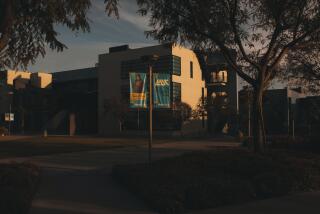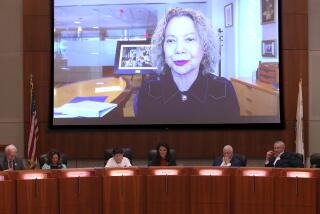State Panel Assails Pierce Agricultural Program
- Share via
In what was described as the harshest assessment ever of Pierce College’s agriculture program, a state report urges that school officials improve “squalid and depressing” classrooms, eliminate faculty bickering and investigate declining student performance on standardized tests.
The 14-page report--prepared by an independent, nine-member panel--also calls for an acre-by-acre review of the school’s 250-acre farm to determine whether it should be preserved as open space for crops and animals or developed in spots to include an equestrian center, barns and other facilities.
On Wednesday, college President Daniel G. Means characterized the report as a fair evaluation of the beleaguered department.
“A lot of times you ignore problems,” he said. “But when someone from the outside comes and lays them out for you, it shakes you a little bit, and you say maybe we better do something . . . Our objective is to maintain the farm and get the ag program back on its feet.”
The department has been rocked in recent years by one controversy after another, dividing the farm faculty into two factions and drawing students and community leaders into the fray.
At the heart of the problems are attempts to make the agriculture program appealing to city students. A reorganization over the last few years has concentrated money and resources on the most popular subjects--horticulture, horse care and veterinary-related courses--as opposed to traditional farm classes on cows, sheep and hogs. That has prompted resistance from faculty members teaching classes with dwindling enrollments.
A state mediator, commissioned last year to resolve a personnel problem, recommended the outside review of the department, which Jean Loucks, former acting president of Pierce, set into motion.
The review also found that:
* The general condition of the department’s classrooms, furniture, laboratories, equipment and farm areas is run down. Horticulture classrooms, in particular, are “squalid and depressing,” it said. Hallways and restrooms are infested with flies, said Mick Sears, department chairman. Classrooms are dirty and have poor lighting. Tiles are falling from the ceiling.
* Computers in the department are obsolete, and many do not work.
There is “a considerable amount of infighting and bickering” among faculty members. “To make matters worse,” the report said, “some faculty discuss their differences and problems with students and with the public. This is an intolerable situation.”
* The success rate of animal-health technology students on a state examination has dropped in recent years, from 100% of the group passing to 60%.
Sears said he thought the decline in the passing rate was a result of material included in the test but not covered in the curriculum. He said the scores are not an accurate reflection of student achievement or instructor performance.
Solving Problems
To help solve problems identified in the report, members of the review team recommend that Pierce administrators establish a program for evaluating, retraining and, if necessary, firing agriculture instructors. “Students must not be subjected to real or imaginary problems faculty may have with each other,” the report said.
It also urged that more money be allocated to solve departmental problems, that recruitment efforts be increased to attract more students and that donations be solicited from the farm industry.
And it concluded that homeowner groups, which have opposed commercial leases on the property, should not play a primary role in land-use decisions unless they are willing to support the farm financially.
The report praised the performance of some animal science instructors and office personnel, “especially in light of the turmoil present in the department.” It also commended the equine, horticulture and animal-health-technology programs.
Means has circulated the report among faculty members and community leaders, seeking suggestions to solve problems. He said he will begin meeting with various groups when the fall semester begins in September.
That process will coincide with a review of the department’s curriculum, scheduled to be completed in December. Means said he hopes to make needed improvements by spring and predicted that more money will be available for maintenance and repairs.
Sears, meanwhile, called the review “nothing new.”
“I’m not belittling the report,” he said. “But what they have addressed is already known to us and has been for a number of years. Unfortunately, there are no nice answers.”
More to Read
Sign up for Essential California
The most important California stories and recommendations in your inbox every morning.
You may occasionally receive promotional content from the Los Angeles Times.













